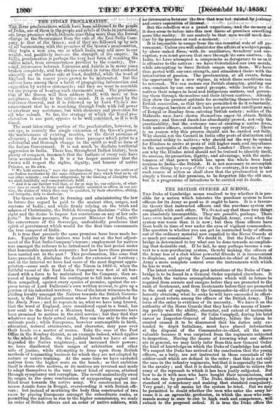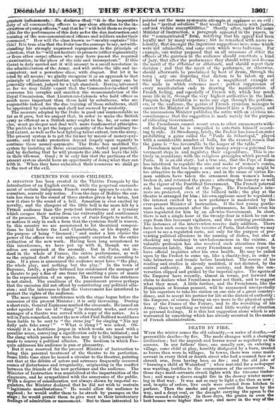THE BRITISH OFFICER AT SCHOOL.
Tim Duke of Cambridge seems resolved to try whether it is pos- sible for a nation which tolerates the purchase system to have officers for its Army as good as it ought to have. It is a favour- ite theory that instructed officers and the purchase system are compatible with each other. WeAnzet-say that these two things are absolutely incompatible. They are possible, perhaps. There havceven been good cancers in the English Army, even when the system was lime than it is now; but then those officers have been built in time of war under the eyes of vigilant commanders. The question is whether you can get an instructed body of officers out of the ordinary material now supplied to the Horse Guards at so much per commission ? We doubt it. But the Duke of Cam- bridge is determined to try what can be done towards accomplish- ing that desirable end. If he fail, he may perhaps become a con- vert to a non-purchasing system, thereby making the officers of the Army less of a club whose powerful friends it is inconvenient to displease, and giving the Commander-in-chief of the British Army a more complete control over the instruments with which- he has to work.
The latest evidence of the good intentions of the Duke of Cam- bridge is to be found in a General Order reprinted elsewhere. It sets forth the various accomplishments which will in future be required from comets and ensigns before they are promoted to the rank of lieutenant, and from lieutenants before they are promoted to the rank of captain. If the Commander-in-chief succeeds in honestly obtaining what he seeks he will have succeeded in effect- ing a great reform among the officers of the British Army. The issue of the order is evidence of its necessity. We have it on the authority of the Horse Guards that they have the means of know- ing pretty well the ability, character, and extent of instruction of every regimental officer. Sir Colin Campbell, during his brief career as Inspector-General of Infantry, -before the alarm he created caused it to be discovered that his duties only ex-
tended to depot battalions must have placed information at the disposal of the battalions, all the more
valuable because it was surprised from the regiments subjected to inspection. Having the means of knowing what our officers are in general, we may fairly infer from this new General Order the kind of knowledge on which the Duke of Cambridge has acted. We suspect the Duke has arrived at the conclusion that the young officers, as a body, are not instructed in those essentials of the soldier-craft which are defined in the order ; that this is not only the case in the infantry regiments, but that it is especially the case in the cavalry ; and that it is desirable if possible to relieve the army of the reproach to which it has been justly subjected. But how to do it with men who have bought their commissions, and who can rise by purchase ? The Duke thinks, by interposing a standard of competency and making that standard compulsory. Very good ; by all means let the system be tried. But we may be permitted to doubt whether the men who enter the army be- cause it is an agreeable profession, in which the man who com- mands money is sure to rise to high rank and competence, will submit to the proposed ordeal. It is true the Duke offers the
gtsacteht o ..dechiteerthatt3 "rite int othe. imporatike duty of all commanding officers to.tpeasoleke atfentiontellie.iinc,
stinotiote of Toxin§ efficees;"rend willhold. theta esiiespod- sible for the performance of this duty anfer tlieshininstreetion iutdi training • of: den nonuiaminionedi offwersandt Soldiere under their! command." How will the class iinown as eavaky.eaptaiiis" like this? Itii• tine alio that-the:Duke has. the Flowage torSayi notwith- standing hie stronglrlixpressed !fsziptigentinciee to the . principle of selection; that hel‘NnlIn'ot hesitate to promote .(either regimentelly• orrfrom other corps)offieers Who .may :lave puma the required • e/iuninationine thelplace of .• the-idle andi incompetent." .if.thisl threat is duly carried iinti it- will anionnt to a Brealbrevolation'in- theadmiiiistration of the Army, end will • staike,the; idle and lei' conipetent,, not ,d poiverbusliaass;••ivith disgust: Mut let it be triet.by 41h/twat:is; -we fOullysTecognize it as an approach to that. principle! of. judicious •iseleation .without .which me ermreare be generalist: efficient, ;judged by: a; high standard. Ruin.. advanced. so far • we rimy' fairlY/ expect that-the: Commandersiin?-eilief• overcome his scruples andcrsanetioh,!the.,reoonyeaulation ' of the Royal Commission, that !Liertitinent-Colonels .Who .hold officeS so much more 'important !than-those held' !bysubalterns who are regiOnsible indeed for thedue; trainink of .those subalterns, shall be:appointed by eeleatiotrauti shell not sueeeed brsdniority. :411(emetistare adgitell by the Duke is goodUnd!eoniinendable as fai'a ill goes; !but suspect' that, in order; - to -make the • British'. alley as efficient as .a British .ariny- ought te behe; jor som e one else, must: go.. deeper and deal with.. more fundeinetital. phtieiples: The•probleat! is•tb get the largest qtiaittity the, best !military ta- • lent extAnt, is Well as the bestfighting talent extant, into the army.' Tho•pitgOnt system is to gdt theilormer :by nieanti!! of . meheypay-'. mentig"eititi tolnake prometion depend 'largely upon' capacity to continnefthisie imerneppaynients: 'Thie•Thike. has modified the system by insisting On: these) ebiarainations, 'verbal and preeticali and 'by declaring that he 'will 'promote the (Netted leave the idle in their idleness. God; - it is. 'only fair. that the partizans of the' present system' should have.an opportunity of-dainkwhat they can
with it. . When they have exhiutted !their resOarcei shall go • to the root of the evil.'



























 Previous page
Previous page